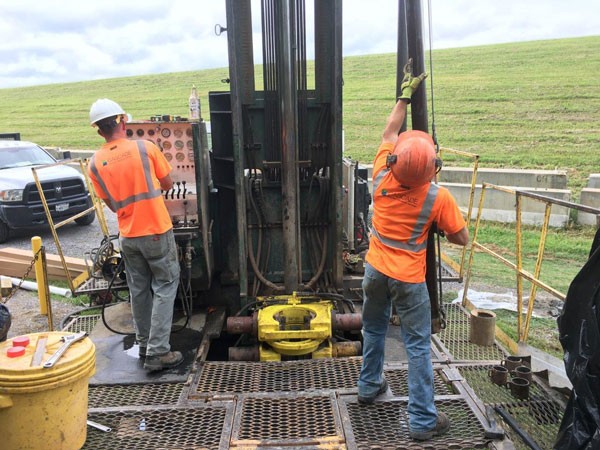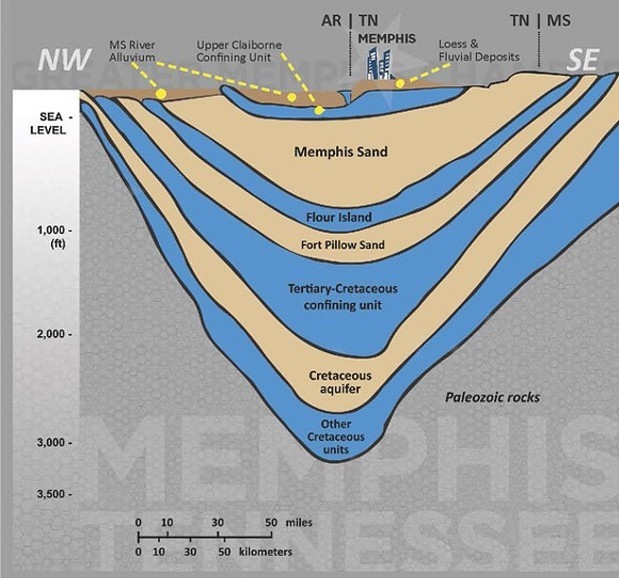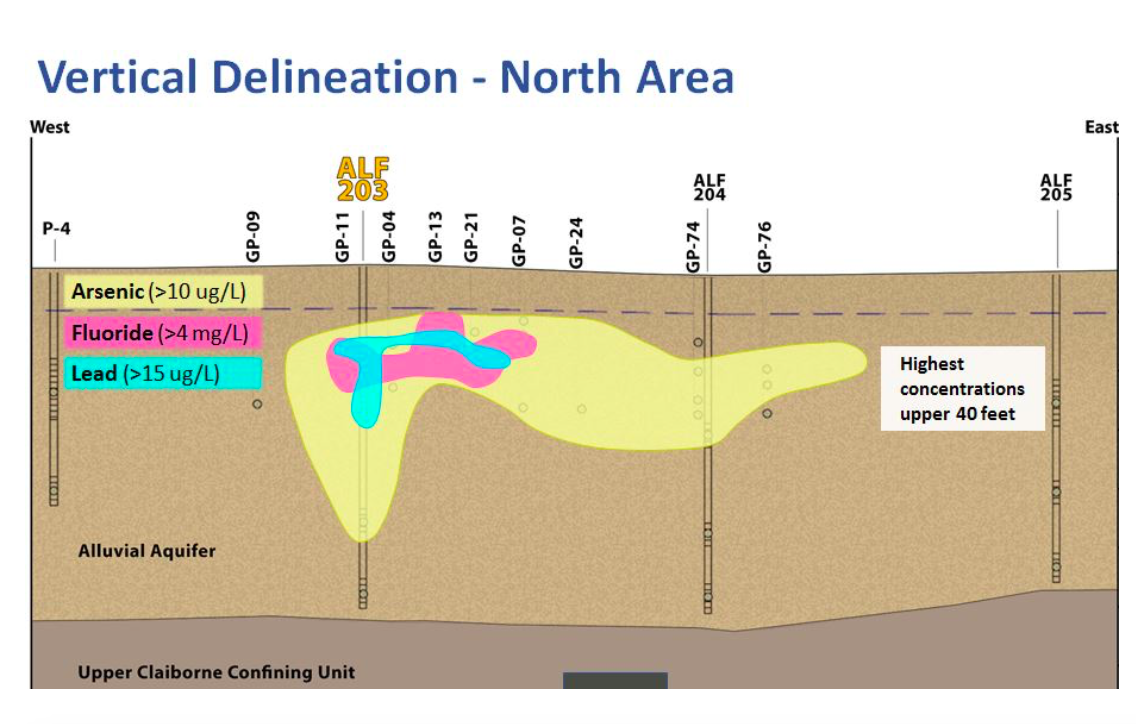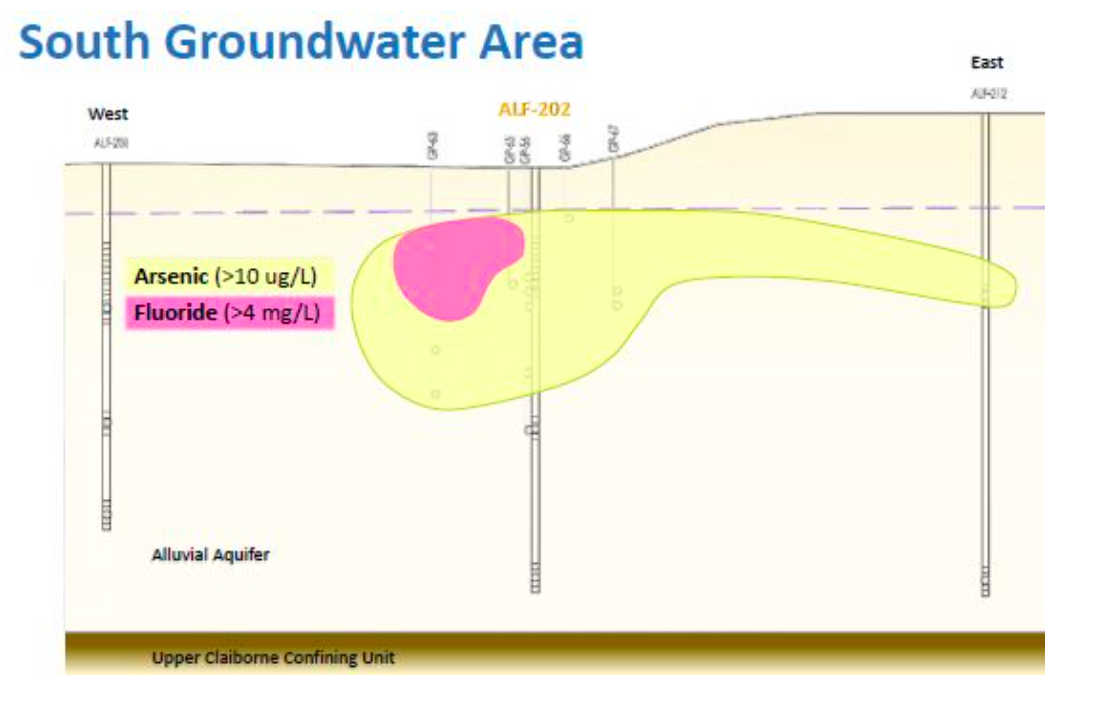 Tennessee Valley Authority
Tennessee Valley Authority
TVA workers install water quality monitoring wells near the Allen Fossil Plant.
Tests found no contaminants in Memphis’ drinking water source but the Tennessee Valley Authority said Wednesday it won’t operate wells drilled into the Memphis Sand Aquifer “at this time,” and will, instead, shift to a contingency plan.
Last spring, TVA found high levels of arsenic, fluoride, and lead in ground water around its Allen Fossil Plant plant. The toxins were found a half of a mile mile away from five new wells TVA had drilled into the Memphis Sand Aquifer, the famously pure source of the city’s drinking water. Those wells were to draw 3.5 million gallons of water every day to cool its new natural-gas-fed energy plant here.
The finding triggered an investigation into the nature and extent of the contamination by TVA, an investigation overseen by the Tennessee Department of Environment and Conservation (TDEC).
The five wells drilled into the Memphis Sand Aquifer were run for 24 hours. Water samples were taken and studied.
That test, led by the United States Geological Survey (USGS) and the University of Memphis (U of M), found arsenic and “other constituents” in the upper Alluvial aquifer, a shelf of water closer to the surface of the ground than the Memphis Sand.
 Corey Owens/Greater Memphis Chamber
Corey Owens/Greater Memphis Chamber
“The public water supply from the deeper Memphis Aquifer is not impacted,” TVA said in a statement Wednesday.
However, TVA said the pump tests suggest there is a “hydraulic connection between the Alluvial and Memphis Aquifers.”
“More investigation is necessary to better understand the connection and the impacts of the existing industrial wells in the surrounding area,” TVA said. “No contaminants were found in TVA’s Memphis Aquifer production wells at the natural gas plant. However, TVA remains committed to not operating the wells at this time.”
 Tennessee Valley Authority
Tennessee Valley Authority
The depth and amount of the contamination, according to the TVA investigation.
 Tennessee Valley Authority
Tennessee Valley Authority
The depth and amount of the contamination, according to the TVA investigation.
TVA said it still plans to bring its brand new natural gas plant online in late spring.
To do that, it has worked out a contingency plan that includes buying water from Memphis Light, Gas, & Water (MLGW) for daily operations, ”building two, 2.5 million-gallon water tanks at the Allen site to help meet peak power demands, and building a second redundant water feed to increase reliability of the water supply for the plant.”
 TVA
TVA
Crews work to build pads for two, 2.5 million-gallon water tanks to be built on the site of TVA’s new Allen Combined Cycle power plant here.
TVA submitted its full investigation report to TDEC Tuesday.
The Memphis branch of the Sierra Club and Protect Our Aquifer filed a lawsuit last February to appeal the permits for the wells granted to TVA from Shelby County. That lawsuit was dismissed but the groups have worked alongside the Shelby County Groundwater Control Board to update the board’s procedures to issue well permits.
”I feel like I have not wasted my time in the last year,” said Scott Banbury, conservation program coordinator with the Tennessee Chapter of the Sierra Club, of the news on TVA’s shift. “Had (TVA) run these things, we may have found ourselves in a really sticky place a few years down the road.”
It was a Sierra Club lawsuit, Banbury said, that sparked the construction of the new natural gas energy plant here. He hopes TVA will bring on the cleaner plant soon. Also, he hopes now they will, once again, consider using treated gray water from MLGW to cool the plant.

TVA is replacing the Allen Fossil Plant (above) with a new gas plant.
“It’s important to know that while (the water) is coming from MLGW, which is a known source, instead of wells around (TVA’s) contaminated ash pond, (TVA) should not be using our drinking water to cool the plant, which is just not worthy,” Banbury said.
Amanda Garcia, an attorney with the Southern Environmental Law Center (SELC) said her group still has “major concerns that the pressure from pumping millions of gallons of water each day from a nearby station could pose similar contamination risks.”
“These threats to Memphis’s drinking water source could have been avoided if TVA had gone through the appropriate steps including conducting an in-depth environmental review, involving the public in the decision-making process and admitting its on-site contamination sooner,” Garcia said in a statement. “TVA should learn from its past mistakes and involve the public now in deciding how to provide water for the gas plant, including fully analyzing options like using recycled gray water as it originally proposed to the citizens of Memphis.”
Ward Archer, president of Protect Our Aquifer, said the test results make him glad TVA ran the tests.
“It confirms my worst fear that if they had operated those wells they would have pulled the contaminated water into the Memphis Sand Aquifer,” said Archer. “I feel like we’ve done the right thing. Now, they’re doing the right thing, which is good.”
Archer said he hopes that TVA will now take a second look at using treated gray water from MLGW to cool the plant. Now, he said his group can focus on shaping groundwater rules with the Shelby County Groundwater Control Board.
“I feel really great that with Protect Our Aquifer, and all the people who contributed, and the yard signs, citizens can make a difference,” Archer said. “It’s one of those things where we really got something done.”